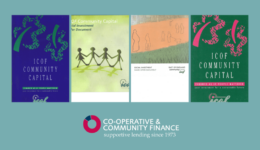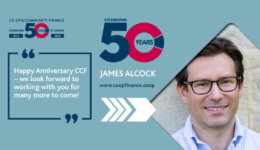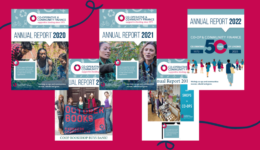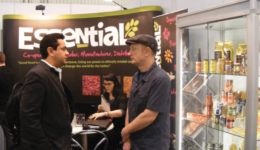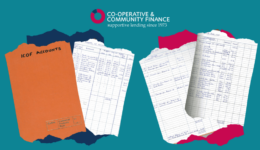Fifty years of friendship and finance – meet Rhona Howarth
In our interview series chatting to people who’ve worked with us over the last fifty years, today we speak to Rhona Howarth. Rhona joined the ICOF Board in 1983 and became our first female Chair.
“I joined the ICOF Board in 1983 and remained a trustee for ten years, until November 1993. I was, at the time I joined, a member of a cooperative Durham Wholefoods Co-operative, and we were ICOF borrowers. I was also very active with ICOM as it was called in those days (now Co-operatives UK) and after leaving the wholefoods co-op in about 1983, I went to work for a regional grouping of ICOM called ICOM North. This was a small regional group in Newcastle, a co-op development agency, and we supported co-op members in the region – there were quite a lot of members in the region at the time. We were one of the early regions to build a thriving worker cooperative sector I was also involved with setting up what we called ICOM Women’s Link Up, which was the first women’s section of ICOM in those days. For a number of years, in the 80s and early 90s, we had women’s programmes running, focussed around setting up and running cooperatives by women across the country, supported by a fairly large European Social Fund grant.
I became Chair of ICOF in 1987, at the point at which we had just launched the PLC and raised the funds for additional lending, so I was Chair of PLC as well as ICOF Limited. I was chair for four years, the first woman chair. The things I remember fondly are that there were really great people involved. I really enjoyed working with the trustees and the staff and learning from them. That’s not to say that it didn’t have its challenges at times.
I also felt I learned a huge amount being Chair, particularly about governance, and how Boards should work and shouldn’t work, and I’ve carried that on right into my work to this minute. I became a consultant fairly early on still when I was with ICOF, and I’ve worked in the field of governance ever since very often with a focus on women. Clearly the cooperative sector itself is big on governance because of the legal and operating structures that we use and so I learned a lot about that and the legal frameworks within which we operated. Lending money into that sector and monitoring those loans, brought with it another layer of complexity and learning. In latter years I have worked mostly in the charitable sector, supporting boards – the learning stays with you.
ICOF was still very young when I joined the Board, only 10 years old, and there were conversations going on about our own internal governance and structures, we spent time putting together written policies to support our governance. There was also quite a strong cooperative sector building up at that time with some very strong values and views about how things should and should not be done. ICOF was lending into that new, emerging cooperative sector. The trustees were drawn from a range of co-operatives including the more traditional co-op sector. I recall there being debates about the differences and needs of newer co-op’s who practiced collective working governance and management.
We had a real range of people, skills and experiences on the Board – including a representative from the Coop Bank and one from the Co-op Union and several others who were members of workers cooperatives, some of them quite traditional in business style. The lead member of staff throughout my time was David Ralley who had come from Scott-Bader. Interestingly we always called the Directors ‘Trustees” and the lead member of staff ‘the Secretary’ even though we were not a charity. I think this reflected the early funding which was gifted to us by Scott Bader and then publicly funded through the government ICO Act (1976). We did have quite a detailed discussion when I was Chairing about whether we should pay trustees for their role as legally this was permitted but we chose not to do so, as we felt that might change the relationship between the Board, staff and the membership. There was still a very strong commitment to ICOF being run by representatives of the co-op sector for the benefit of the wider sector, paying board members could have changed this.
Overall being a trustee was a very positive experience for me and I think of the people I worked with very fondly.
“Happy birthday, ICOF who would have thought it, 50 years!”




